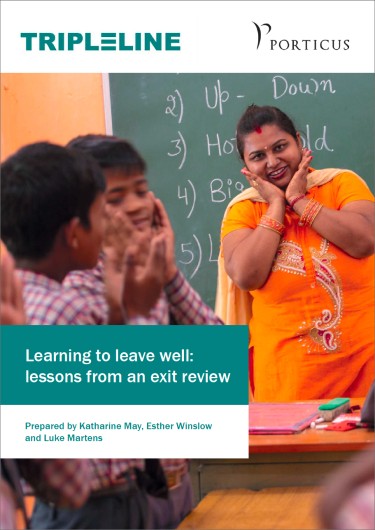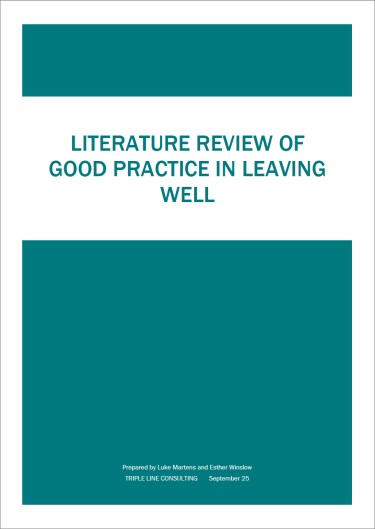In philanthropy, knowing when—and how—to exit a programme or geography can be just as important as knowing when to invest.
In 2023-2024, Porticus, a philanthropic organisation that aims to create a just and sustainable future where human dignity flourishes, faced this challenge in its education portfolio (which is formally known as the Building Future Generations (BFG) sector). Following an education sector strategy refresh in 2022, Porticus underwent a difficult transition and exit process in 10 programmes and five clusters of work, with most closing earlier than planned.
Commissioning the Exit Review
To understand what worked, what didn’t, and what could be learnt from these exits, Porticus commissioned Triple Line to conduct an in-depth Exit Review. This offered a unique opportunity to study an area of programme management that generally receives less attention and is highly relevant to the wider sector, especially in today’s climate of limited funding and budget cuts.
The review consisted of an external literature review of philanthropic exits, interviews with partners, external practitioners and Porticus staff, and six deep-dive case studies into a selection of the programmes that closed. We considered the decision to exit and its communication, the process and management of the exit, and the impact of the exit on programmes and partners.
The review generated lessons on how to exit programmes and geographies responsibly, and provides recommendations for designing and managing programmes with exit planning in mind. Although aimed primarily at Porticus Senior Leadership, governance and Programme Management staff to inform future exit decisions and practices, the review also offers practical lessons for other funders and stakeholders interested in responsible programme exits.
Key Takeaways for Funders
Porticus was keen to share these learnings, and thus the key findings from the review were collated into an accessible summary report. The report makes several important recommendations that Porticus is already applying to shape its ongoing work. Some key takeaways include making sure to align exit criteria with an organisation's funder identity and previous messaging around strategic focus, while also considering the potential impact of the decision on each individual context to adapt whether, how, and when an exit will take place.
It is equally crucial to co-create exit plans with partners from the outset of the relationship and ensure that sustainability considerations are meaningfully implemented. Strong communication during an exit process is also paramount: funders need to clearly communicate the exit and its implications to staff and partners as soon as possible, while also providing staff with guidance and support as they manage the exits.
Exits as Transitions, Not Endings
Porticus’ experience of programme exits in the BFG sector, both in its successes and its challenges, underscores that exits are not abrupt endings—they are transitions. With foresight, collaboration and commitment to sustainability, leaving well can protect the investments already made and empower partners to thrive independently.
"We have already held excellent internal reflections on the findings from this review and we are using it to shape the work under our 2023-2029 programming. It is critical that philanthropic organisations like ourselves, and other funders, reflect on what sustainability and exiting well really means. These aren’t just buzzwords".
"We want to find the best ways to have clear strategies and support partners to generate maximum impact in ways that are catalysing efforts. We want to innovate and take risks to help systems be bolder and more effective, but not create parallel systems or false expectations that our funding support will or should exist forever".
Rob Doble, Sector Director, Building Future Generations (BFG), Porticus
www.porticus.com
Both the published report on lessons from this review as well as the literature review capturing external evidence on programme exits are available to download below.





